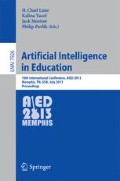Abstract
In this paper, we explore the potential of gaze data as a source of information to predict learning as students interact with MetaTutor, an ITS that scaffolds self-regulated learning. Using data from 47 college students, we show that a classifier using a variety of gaze features achieves considerable accuracy in predicting student learning after seeing gaze data from the complete interaction. We also show promising results on the classifier ability to detect learning in real-time during interaction.
Access this chapter
Tax calculation will be finalised at checkout
Purchases are for personal use only
Preview
Unable to display preview. Download preview PDF.
References
Azevedo, R., Behnagh, R., Duffy, M., Harley, J., Trevors, G.: Metacognition and self-regulated learning in student-centered leaning environments. In: Theoretical Foundations of Student-centered Learning Environments, 2nd edn., pp. 171–197 (2012)
D’Mello, S., Olney, A., Williams, C., Hays, P.: Gaze tutor: A gaze-reactive intelligent tutoring system. Int. J. Hum.-Comput. Stud. 70, 377–398 (2012)
Kardan, S., Conati, C.: Exploring gaze data for determining user learning with an interactive simulation. In: Masthoff, J., Mobasher, B., Desmarais, M.C., Nkambou, R. (eds.) UMAP 2012. LNCS, vol. 7379, pp. 126–138. Springer, Heidelberg (2012)
Anderson, J.R., Gluck, K.: What role do cognitive architectures play in intelligent tutoring systems. In: Cognition & Instruction: Twenty-five Years of Progress, pp. 227–262 (2001)
Conati, C., Merten, C.: Eye-tracking for user modeling in exploratory learning environments: An empirical evaluation. Knowledge-Based Systems 20, 557–574 (2007)
Qu, L., Johnson, W.L.: Detecting the learner’s motivational states in an interactive learning environment. In: Proc. of 12th Int. Conf. on Artificial Intelligence in Education (2005)
Muldner, K., Christopherson, R., Atkinson, R., Burleson, W.: Investigating the Utility of Eye-Tracking Information on Affect and Reasoning for User Modeling. In: Houben, G.-J., McCalla, G., Pianesi, F., Zancanaro, M. (eds.) UMAP 2009. LNCS, vol. 5535, pp. 138–149. Springer, Heidelberg (2009)
Sibert, J.L., Gokturk, M., Lavine, R.A.: The reading assistant: eye gaze triggered auditory prompting for reading remediation. In: Proc. of the 13th Annual ACM Symposium on User Interface Software and Technology, pp. 101–107 (2000)
Kinnebrew, J.S., Biswas, G.: Identifying Learning Behaviors by Contextualizing Differential Sequence Mining with Action Features and Performance Evolution. In: Proc. of EDM, 5th Int. Conf. on Educational Data Mining, pp. 57–64 (2012)
Bouchet, F., Azevedo, R., Kinnebrew, J.S., Biswas, G.: Identifying Students’ Characteristic Learning Behaviors in an Intelligent Tutoring System Fostering Self-Regulated Learning. In: Proc. of EDM, 5th Int. Conf. on Educational Data Mining, pp. 65–72 (2012)
Sabourin, J.L., Mott, B.W., Lester, J.C.: Early Prediction of Student Self-Regulation Strategies by Combining Multiple Models. In: Proc. of EDM, 5th Int. Conf. on Educational Data Mining, pp. 156–159 (2012)
Azevedo, R., et al.: The Effectiveness of Pedagogical Agents’ Prompting and Feedback in Facilitating Co-adapted Learning with MetaTutor. In: Cerri, S.A., Clancey, W.J., Papadourakis, G., Panourgia, K. (eds.) ITS 2012. LNCS, vol. 7315, pp. 212–221. Springer, Heidelberg (2012)
Goldberg, J.H., Helfman, J.I.: Comparing information graphics: a critical look at eye tracking. In: Proc. of BELIV, 3rd Workshop: BEyond time and errors: novel evaLuation methods for Information Visualization, pp. 71–78 (2010)
Guyon, I., Elisseeff, A.: An introduction to variable and feature selection. The J. of Machine Learning Research 3, 1157–1182 (2003)
Landis, J.R., Koch, G.G.: The measurement of observer agreement for categorical data. Biometrics 33, 159–174 (1977)
Ben-David, A.: About the relationship between ROC curves and Cohen’s kappa. Engineering Applications of Artificial Intelligence 21, 874–882 (2008)
Kardan, S., Conati, C.: Comparing and Combining Eye Gaze and Interface Actions for Determining User Learning with an Interactive Simulation. In: Carberry, S., Weibelzahl, S., Micarelli, A., Semeraro, G. (eds.) UMAP 2013. LNCS, vol. 7899, pp. 215–227. Springer, Heidelberg (2013)
Author information
Authors and Affiliations
Editor information
Editors and Affiliations
Rights and permissions
Copyright information
© 2013 Springer-Verlag Berlin Heidelberg
About this paper
Cite this paper
Bondareva, D., Conati, C., Feyzi-Behnagh, R., Harley, J.M., Azevedo, R., Bouchet, F. (2013). Inferring Learning from Gaze Data during Interaction with an Environment to Support Self-Regulated Learning. In: Lane, H.C., Yacef, K., Mostow, J., Pavlik, P. (eds) Artificial Intelligence in Education. AIED 2013. Lecture Notes in Computer Science(), vol 7926. Springer, Berlin, Heidelberg. https://doi.org/10.1007/978-3-642-39112-5_24
Download citation
DOI: https://doi.org/10.1007/978-3-642-39112-5_24
Publisher Name: Springer, Berlin, Heidelberg
Print ISBN: 978-3-642-39111-8
Online ISBN: 978-3-642-39112-5
eBook Packages: Computer ScienceComputer Science (R0)

